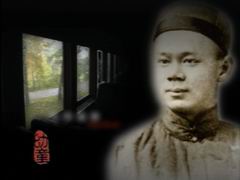Source: CCTV.com
08-14-2006 15:54

On June 8 1881, the Central Foreign Office proposed to the emperor that all the Chinese students be called back to China. "Because they went abroad at an age susceptible to external influences, gradually they adopted the local customs and became culturally displaced and remodeled. Before they could have acquired the advanced technology of the west, they all plunged themselves into the American culture. The government is severely disheartened. Since all bureaus are in urgent need of talented people, they should be recalled immediately." The proposal was approved by the emperor the next day.
In 1881 the Chinese students spent their last summer vacation in the US. In fact, half of them had already entered university. Other students had planned to start their college after the vacation. Of all the students, only Zhan Tianyou and Ou Yanggeng had completed their undergraduate study.
In July 1881, the Chinese Educational Mission located at Hartford was closed. In the preceding nine years, the Qing Government had sent 120 Chinese students to the US, at an average age of 12 years old. Some of them were called back earlier, some died in the foreign land and the rest of them-- 94 Chinese children were recalled to China in 1881.
In August 1881, Rev. J. Twichell held a farewell party for the departing Chinese children at the Asylum Church in Hartford.
At the party, Margaret, the daughter of Mrs. Bartlett, the hostess, wrote a letter to Wu Yangzeng's mother. Wu was leaving for China.
In the autumn of 1881, all the Chinese students went back to China in three detachments.
This is a letter written by Huang Kaijia to his US hostess after he came back to China. It was like a complaint to a mother from a child with lots of grievances.
After a week of detainment, they were given a short vacation to visit their families. Huang Kaija went back to his hometown Shantou. A domestic servant refused him entry to his family house. He was now a stranger who could not speak the hometown dialect.
The boy students, back from the US, were regarded as nuisances to the society at home. The press plagued them upon their return. The September 29th 1881 issue of the Shen PaoShanghai Newspaper said that the students who had cost the government so dearly for their overseas study had , failed to live up to the high expectations. None of the Chinese students were from families of influence and wealth; all were mere plebeians of various backgrounds. They were certainly not up to understanding western studies and naval strategy. Most of them were so retarded and cross that it was said that, when in America, any talk of state affairs would immediately turn their brains to a sleepy stupor. How could one ever expect anything out of them?
The July 23th, 1881 edition of New York Times read that: "The educational scheme which the Chinese Government has been trying in this country for ten years has been, from our point of view, very successful. These young men have learned telegraphy, and there is not a mile of electric wire permitted under the auspices and sanction of the Chinese Government. They have made themselves familiar with the practical working of railways, and their Government bought and dismantled the only railway ever built within the limits of the Celestial Empire. China cannot borrow our learning, our science, and our material forms of industry without importing with them the virus of political rebellion. Therefore, she will have none of these things."
After a short holiday in Shantou, Huang Kaijia went back to Shanghai to find that most of his classmates already left for Tianjin. No doubt, they had all been called back by Li Hongzhang.
At the end of 1881, Li Hongzhang met in Tianjin those students assigned to BeiYang Army. They were wearing mandarin gowns now instead of western suits.
Some high-ranking officials, in their proposals to the emperor, pointed out that the so-called foreign affairs movement actually promoted reforms. They said foreigners excelled in machinery while the Chinese had support from the people. " Li's school has forsaken the Chinese ethos in favor of foreign knowledge. Should everyone adore the west, when we have acquired foreign weaponry, none would like to risk his life for China."
During the ten years of the Education Mission in the U.S., the so-called Westernization movement in China had made leaps and bounds. When the first group of students left for the U.S., Li Hongzhang already set up China Merchant's Steam Navigation Company, the first commercial enterprise to compete with foreign counterparts and to break the foreign monopoly over China's marine transportation. In 1878, the Kaiping Coal Mine was founded. In 1881, the first railway in China was built. In 1879, the first cable line was laid in China. The Foreign Affairs Office was in great need of talents.
